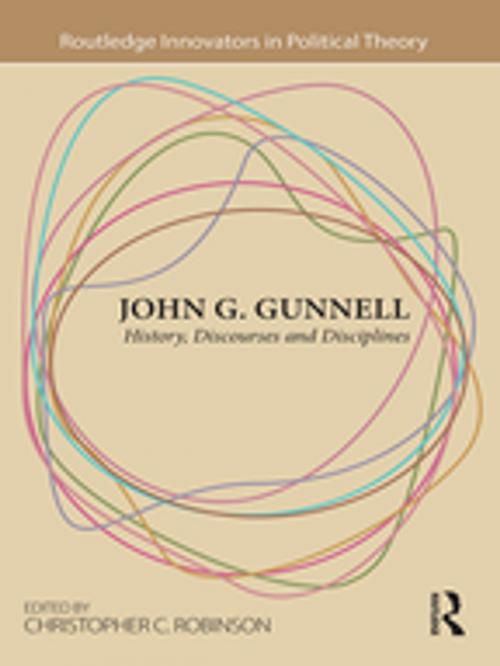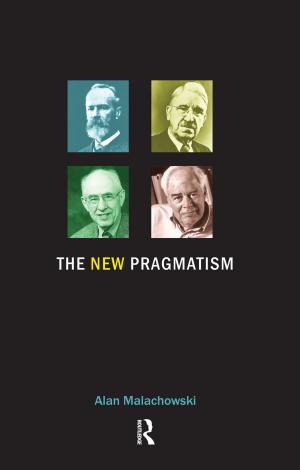John G. Gunnell
History, Discourses and Disciplines
Nonfiction, Social & Cultural Studies, Political Science, Government, Civics, Political Parties| Author: | ISBN: | 9781317435808 | |
| Publisher: | Taylor and Francis | Publication: | October 14, 2016 |
| Imprint: | Routledge | Language: | English |
| Author: | |
| ISBN: | 9781317435808 |
| Publisher: | Taylor and Francis |
| Publication: | October 14, 2016 |
| Imprint: | Routledge |
| Language: | English |
John Gunnell has compelled political theorists to rethink their relation to political science, the history of political thought, the philosophy of social science and political reality. His thinking has been shaped by encounters with Heidegger and Plato, Wittgenstein and Austin, the Berkeley School and émigrés such as Strauss and Arendt. His writings have challenged the idealist assumptions behind the idea of a Great Tradition of Political Thought and the philosophical claims about mind and language. Gunnell has engaged and challenged colleagues in political theory, political science and the philosophy of social science on a range of issues from political action, time, pluralism, ideology, concepts, conventions, "the political" and democracy to the roles of philosophy, science, literary theory, cognitive science, mind, and history on the enterprise of theorizing today.
The book focuses on his work in three key areas:
Political Theory and Political Science
Gunnell’s work has often focused on the historical emergence of the study of political theory as a subdiscipline of political science, and its critical relation to and alienation from political science from the postwar era. His argument has been consistent: political theory self-identified as an interpretative social science and mode of historical reflection is an invention of political science. Political theory divorced from political science weakens both activities in their ties to, concerns with and relevance to political society and the contemporary university.
Interpretation and Action
Gunnell has been particularly interested in the nature of concepts and how they change. These investigations begin with analysis of theory and theorizing as they are constituted and practiced in historiography, the philosophy of social sciences, the philosophy of science, political science and metatheory. He engages with thinkers whose positions inform and oppose his own and explores concepts such as: democracy, justice, time, pluralism, science, liberalism, and action.
Theorists, Philosophers, and Political Life
Gunnell’s work has developed through a series of encounters with theorists and philosophers. He has rejected attempts to present politics as a stable and essential set of phenomena. There are common themes that guide conversations with the German émigrés, ordinary language philosophers, and theorists from the history of political thought. This book includes works that focus on Max Weber, Leo Strauss and Eric Voegelin, Gilbert Ryle, J.L. Austin and Ludwig Wittgenstein.
John Gunnell has compelled political theorists to rethink their relation to political science, the history of political thought, the philosophy of social science and political reality. His thinking has been shaped by encounters with Heidegger and Plato, Wittgenstein and Austin, the Berkeley School and émigrés such as Strauss and Arendt. His writings have challenged the idealist assumptions behind the idea of a Great Tradition of Political Thought and the philosophical claims about mind and language. Gunnell has engaged and challenged colleagues in political theory, political science and the philosophy of social science on a range of issues from political action, time, pluralism, ideology, concepts, conventions, "the political" and democracy to the roles of philosophy, science, literary theory, cognitive science, mind, and history on the enterprise of theorizing today.
The book focuses on his work in three key areas:
Political Theory and Political Science
Gunnell’s work has often focused on the historical emergence of the study of political theory as a subdiscipline of political science, and its critical relation to and alienation from political science from the postwar era. His argument has been consistent: political theory self-identified as an interpretative social science and mode of historical reflection is an invention of political science. Political theory divorced from political science weakens both activities in their ties to, concerns with and relevance to political society and the contemporary university.
Interpretation and Action
Gunnell has been particularly interested in the nature of concepts and how they change. These investigations begin with analysis of theory and theorizing as they are constituted and practiced in historiography, the philosophy of social sciences, the philosophy of science, political science and metatheory. He engages with thinkers whose positions inform and oppose his own and explores concepts such as: democracy, justice, time, pluralism, science, liberalism, and action.
Theorists, Philosophers, and Political Life
Gunnell’s work has developed through a series of encounters with theorists and philosophers. He has rejected attempts to present politics as a stable and essential set of phenomena. There are common themes that guide conversations with the German émigrés, ordinary language philosophers, and theorists from the history of political thought. This book includes works that focus on Max Weber, Leo Strauss and Eric Voegelin, Gilbert Ryle, J.L. Austin and Ludwig Wittgenstein.















